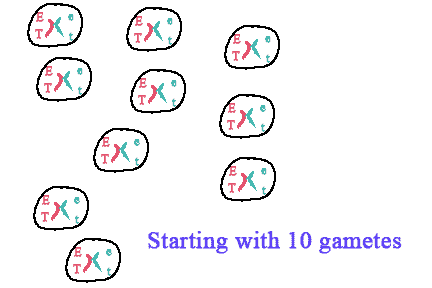But life is not so easy
Life would be relatively easy if linked alleles would just stay put -- this is, if alleles on the same chromosome stayed on the same chromosome. If that was true, then each parent could only have 2 rather than 4 variations on their gametes, and the Punnett squares would be easy to figure out.
 However, just because two alleles start out on the same chromosome does not mean they stay there!
Chromosomes can and do break apart and exchange sections with each other. Once that happens, other
possibilities for gametes also exist. This process is called crossover. (As opposed to the smiley
face on the right, which is cross-stitch).
However, just because two alleles start out on the same chromosome does not mean they stay there!
Chromosomes can and do break apart and exchange sections with each other. Once that happens, other
possibilities for gametes also exist. This process is called crossover. (As opposed to the smiley
face on the right, which is cross-stitch).
The key question is, how does crossover affect the proportions of offspring?
Let's use the Smileys as an example.
| Here are the parental genotypes: | And here is the Punnett Square, assuming no crossover: | |||||||||||||
|---|---|---|---|---|---|---|---|---|---|---|---|---|---|---|
|
Phenotypic ratio 3:1 |
But what if crossover affected these two alleles in 1 out of 10 cases (or more formally, if the recombination frequency is 10%)?
First step: 1 out of 10 chromosomes are now cobbled together out of two pieces. These cobbled together chromosomes will form non-standard gametes. So 10% of gametes will be non-standard. Moreover, there will be 2 kinds of nonstandard gametes. So 5% of gametes will be the first non-standard type, and 5% of gametes second non-standard type.
On the other hand, 90% of chromosomes are 'standard', and these will split evenly into two kinds of standard gametes.
Disclaimer: The movie does NOT depict the process of meiosis, which is more complicated. To be more specific, the replicated chromosomes, shown here, could not have all 4 alleles at the same time. The movie is just a way to rationalize the proportions of different kinds of gametes that result from recombination.

This means the Punnett Square gets considerably more complicated again...
Copyright University of Maryland, 2007
You may link to this site for educational purposes.
Please do not copy without permission
requests/questions/feedback email: mathbench@umd.edu